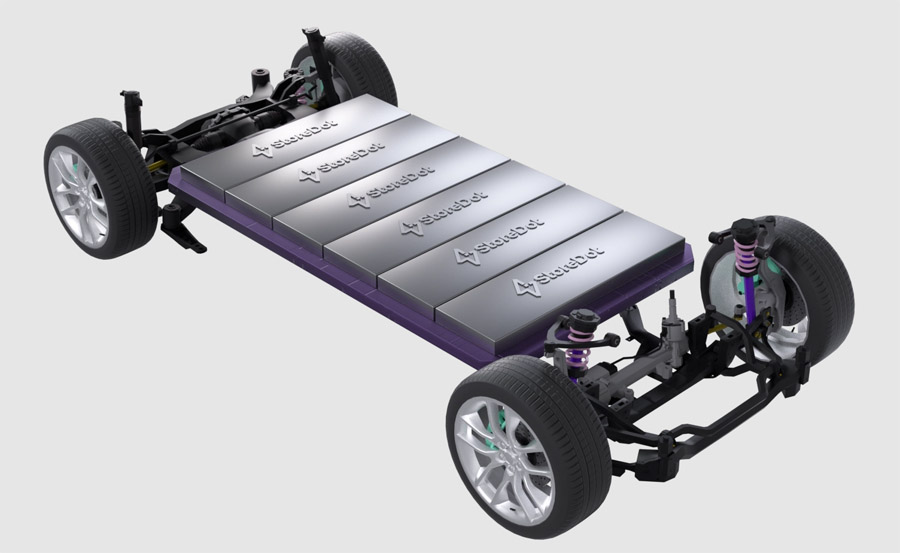Sign up for daily news updates from CleanTechnica on email. Or follow us on Google News!
The quest for faster EV charging reached another milestone this month as Israeli battery maker StoreDot demonstrated its silicon-dominant EV battery technology in a prototype Polestar electric car. In the demonstration, the company was able to reach sustained charging rates of over 310 kW and peak charging rates of 370 kW. This allowed them to charge the prototype Polestar 5’s 77 kWh battery from 10% to 82% in just 10 minutes.
The fully-driveable Polestar 5 prototype was fitted with StoreDot’s high-energy XFC (eXtreme Fast Charging) cells. All cell parameters including temperature, voltage, and charge capacity were monitored throughout the exercise, with the battery pack never exceeding the target operating temperature set by engineers of both the StoreDot and Polestar teams. According to a StoreDot rep, “this proves the maturity and stability of StoreDot’s XFC technology on its path to commercialization.”
Consumer fast charging speeds for EVs remain one of the few barriers to wide-scale EV adoption. Current EVs like the Tesla Model 3 or Model Y can attain 10% to 80% charging in 20-25 minutes on compatible 250kW DC fast chargers, but as EVs become more popular, particularly in urban environments and with ride-share drivers, every minute of charging counts. Faster charging rates allow DC fast charging stations to service more cars per stall per day.
This demonstration showcased StoreDot’s ‘drop-in’ ability to be integrated in an existing car model. The company says that this “paves the way to extreme fast charging a car using available charging infrastructure, rather than using proprietary chargers.”
The company stated that it “remains on track with production-readiness of our XFC cells that deliver 100 miles charged in 5 minutes this year. We aim to deliver 100 miles charged in 4 minutes in 2026 and 100 miles charged in 3 minutes by 2028.”
Check out the video for more details:
StoreDot’s lithium-ion battery chemistry uses silicon rather than graphite in the battery anode. This can not only reduce weight but also simplify and lower the cost of battery production as silicon is in much larger worldwide supply than graphite and the mining and manufacturing process has minimal environmental impact. Also, silicon-based EV batteries are much easier to source from domestic materials in North America which can reduce American manufacturers’ reliance on foreign components for their batteries.

Company execs had this to say about the event.
Dr Doron Myersdorf, CEO of StoreDot: “We are very excited to share this impressive achievement today and are proud to be on this journey with Polestar, a leading car brand who envisions high performance cars with a sustainable future. We’re happy to see our partner is among the first EV car makers to acknowledge that XFC is now a necessary standard to make vast EV adoption a reality. With our extreme fast charging technology, you can add 200 miles in under 10 minutes. This breakthrough revolutionizes EV ownership experience by eradicating the barrier of range and charging anxiety once and for all. Drivers can now truly travel long distances with the same freedom and convenience as traditional petrol-powered vehicles.”
Thomas Ingenlath, CEO of Polestar: “By eliminating charging times that were previously an obstacle, StoreDot’s XFC battery cells combined with our cutting-edge product development and battery engineering have unlocked new frontiers for electric mobility. This technology will reshape consumer expectations and accelerate mass EV adoption by making EV ownership a seamless experience for the mass market.”
The Bottom Line
While many companies are pursuing next generation battery technology including solid-state batteries, StoreDot’s silicon-forward battery design improves charging speeds while leveraging existing lithium-ion battery technology and charging infrastructure. It will be interesting to see which car company is first to bring this to market and what real-world charging speeds they will get using existing DC fast chargers.
Related Reading:
No Graphite? No Problem! Silicon Lithium Ion EV Batteries Are Coming (Yes, Really!)
StoreDot Battery Validated in Independent Testing
Have a tip for CleanTechnica? Want to advertise? Want to suggest a guest for our CleanTech Talk podcast? Contact us here.
Latest CleanTechnica.TV Video
CleanTechnica uses affiliate links. See our policy here.





